Related Research Articles

Alcoholism is the continued drinking of alcohol despite negative results. Problematic use of alcohol has been mentioned in the earliest historical records, such as in ancient Egypt and in the Bible, and remains widespread; the World Health Organization (WHO) estimated there were 283 million people with alcohol use disorders worldwide as of 2016. The term alcoholism was first coined in 1852, but alcoholism and alcoholic are stigmatizing and discourage seeking treatment, so clinical diagnostic terms such as alcohol use disorder or alcohol dependence are used instead.

Benjamin Franklin was an American polymath who was active as a writer, scientist, inventor, statesman, diplomat, printer, publisher, and political philosopher. Among the leading intellectuals of his time, Franklin was one of the Founding Fathers of the United States, a drafter and signer of the Declaration of Independence, and the first postmaster general.

The Province of Pennsylvania, also known as the Pennsylvania Colony, was a British North American colony founded by William Penn, who received the land through a grant from Charles II of England in 1681. The name Pennsylvania was derived from "Penn's Woods", referring to William's father Admiral Sir William Penn.
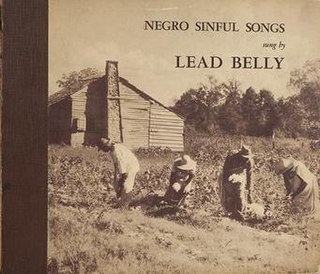
"Black Betty" is a 20th-century African-American work song often credited to Huddie "Lead Belly" Ledbetter as the author, though the earliest recordings are not by him. Some sources say it is one of Lead Belly's many adaptations of earlier folk material.
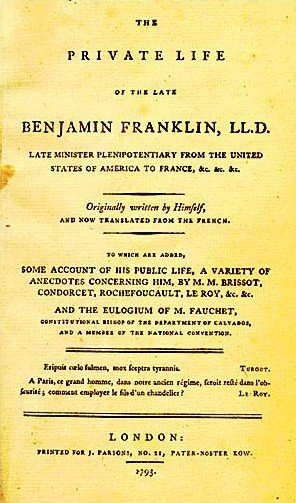
The Autobiography of Benjamin Franklin is the traditional name for the unfinished record of his own life written by Benjamin Franklin from 1771 to 1790; however, Franklin appears to have called the work his Memoirs. Although it had a tortuous publication history after Franklin's death, this work has become one of the most famous and influential examples of an autobiography ever written.
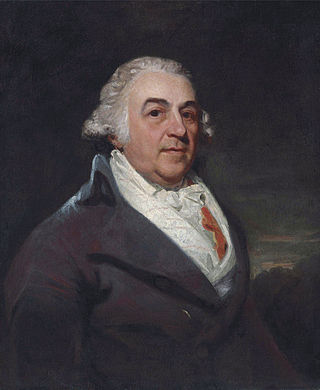
Richard Bache, born in Settle, West Riding of Yorkshire, England, immigrated to Philadelphia, in the colony of Pennsylvania, where he was a businessman, a marine insurance underwriter, and later served as Postmaster-General of the American Post Office. He also was the son-in-law of Benjamin Franklin.

Orlando George Charles Bridgeman, 3rd Earl of Bradford, PC, DL, styled Viscount Newport between 1825 and 1865, was a British courtier and Conservative politician. In a ministerial career spanning over thirty years, he notably served as Lord Chamberlain of the Household between 1866 and 1868 and as Master of the Horse between 1874 and 1880 and again between 1885 and 1886.

The Pennsylvania Gazette was one of the United States' most prominent newspapers from 1728 until 1800. In the years leading up to the American Revolution, the newspaper served as a voice for colonial opposition to British colonial rule, especially to the Stamp Act and the Townshend Acts. The newspaper was headquartered in Philadelphia.
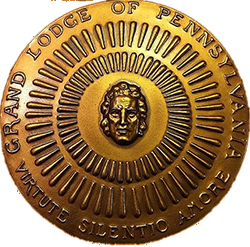
The Grand Lodge of Pennsylvania, officially The Right Worshipful Grand Lodge of the Most Ancient and Honorable Fraternity of Free and Accepted Masons of Pennsylvania and Masonic Jurisdictions Thereunto Belonging, sometimes referred to as Freemasons of Pennsylvania is the premier masonic organization in the Commonwealth of Pennsylvania. The Grand Lodge claims to be the oldest in the United States, and the third oldest in the world after England and Ireland, having been originally established as the Provincial Grand Lodge of Pennsylvania in 1731. This claim is disputed by both the Grand Lodge of Massachusetts and the Grand Lodge of Virginia.

Charles Biddle was a Pennsylvania statesman and a member of the prominent Biddle family of Philadelphia.

Join, or Die. is a political cartoon showing the disunity in the American colonies. Attributed to Benjamin Franklin, the original publication by The Pennsylvania Gazette on May 9, 1754, is the earliest known pictorial representation of colonial union produced by an American colonist in Colonial America.
The modern disease theory of alcoholism states that problem drinking is sometimes caused by a disease of the brain, characterized by altered brain structure and function.

William Duane was an American physicist who conducted research on radioactivity and X-rays and their usage in the treatment of cancer. He developed the Duane-Hunt Law and Duane's hypothesis. He worked with Pierre and Marie Curie in their University of Paris laboratory for six years and developed a method for generating quantities of radon-222 "seeds" from radium for usage in early forms of brachytherapy.

Binge drinking, or heavy episodic drinking, is drinking alcoholic beverages with an intention of becoming intoxicated by heavy consumption of alcohol over a short period of time, but definitions vary considerably.

Union Fire Company, sometimes called Franklin's Bucket Brigade, was a volunteer fire department formed in Philadelphia in 1736 with the assistance of Benjamin Franklin. It was the very first firefighting organization in Philadelphia, although it was followed within the year by establishment of the Fellowship Fire Company. The fire company was formed on 7 December 1736 after a series of publications in the Pennsylvania Gazette by Franklin and others pointing out the need for more effective handling of fires in Philadelphia and remained active until approximately 1820. Although modeled after the Mutual Fire Societies of Franklin's native Boston, the Union Fire Company protected all members of the community rather than only the members of the company.
Canassatego was a leader of the Onondaga nation who became a prominent diplomat and spokesman of the Iroquois Confederacy in the 1740s. He was involved in several controversial land sales to colonial British officials. He is now best known for a speech he gave at the 1744 Treaty of Lancaster, where he recommended that the British colonies emulate the Iroquois by forming a confederacy. He was reportedly assassinated, perhaps by sympathizers or agents of New France.

Francis Folger Franklin was the son of Founding Father of the United States Benjamin Franklin and Deborah Read.

William Parks was an 18th-century printer and journalist in England and Colonial America. He was the first printer in Maryland authorized as the official printer for the colonial government. He published the first newspaper in the Southern American colonies, the Maryland Gazette. He later became authorized as the official printer for the colonial government of Virginia. Parks was also the publisher and printer of the first official collection of the authentic 1733 set of Virginia's laws, and the first colonial publisher and proprietor of The Virginia Gazette newspaper. During his lifetime Parks established four new newspapers in the colonies. He also worked with Benjamin Franklin on several projects related to printing, most notably, the establishment of a paper mill in Virginia, the first such mill south of Pennsylvania.
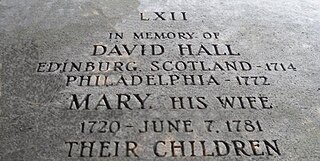
David Hall was a British printer who immigrated from Scotland to America and became an early American printer, publisher and business partner with Benjamin Franklin in Philadelphia. He eventually took over Franklin's printing business of producing official documents for the colonial province of Pennsylvania and that of publishing The Pennsylvania Gazette newspaper that Franklin had acquired in 1729. Hall formed his own printing firm in 1766 and formed partnership firms with others. He published material for the colonial government.

The Bibliography of Benjamin Franklin is a comprehensive list of primary and secondary works by or about Benjamin Franklin, one of the principal Founding Fathers of the United States. Works about Franklin have been consistently published during and after Franklin's life, spanning four centuries, and continue to appear in present-day publications. Scholarly works that are not necessarily subject-specific to Franklin, yet cover his life and efforts in significant measure, may also be included here. In contrast, this bibliography does not include the numerous encyclopedia articles and short essays about Franklin..
References
- ↑ Levine, Harry (1981). "The Vocabulary of Drunkenness". Journal of Studies on Alcohol. 42 (11): 1046. doi:10.15288/jsa.1981.42.1038. PMID 7038310.
- ↑ Benjamin Franklin; William Temple Franklin; William Duane (1859). Memoirs of Benjamin Franklin, vol. 2. Derby & Jackson. p. 496.
- ↑ From the Writings of Benjamin Franklin in the Pennsylvania Gazette 1736–1737 Archived 2008-09-07 at the Wayback Machine
- ↑ Berson, J. S. (2006). "The Source for Benjamin Franklin's "The Drinkers Dictionary" (And Was It Mather Byles?)". American Speech. 81 (2): 164–179. doi:10.1215/00031283-2006-011.
- ↑ Levine, Harry (1981). "The Vocabulary of Drunkenness". Journal of Studies on Alcohol. 42 (11): 1046. doi:10.15288/jsa.1981.42.1038. PMID 7038310.